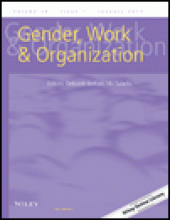
Abstract
Despite numerous governmental attempts to improve women's employment and equality in Pakistan, statistics suggest that these efforts have not been entirely fruitful. Steps taken by the government are usually in response to pressure from international donors and rights groups. However, there seem to be important contextual and sociocultural differences at play when it comes to how gender equality is to be achieved in organizational practice. Such differences, as well as an apparent lack of genuine commitment at the policy level, may explain why there remains a gap between the policy and praxis of gender equality in Pakistan. Informed by structural and relational perspectives of gender, this article draws on in-depth qualitative interviews with female employees to explore the multilevel issues related to gender equality at the macro-national, meso-organizational and micro-individual levels. In particular, it highlights such issues as societal norms of female modesty and gender segregation (macro), sexual harassment, career-related challenges and income gap (meso), and family status and agency (micro).
